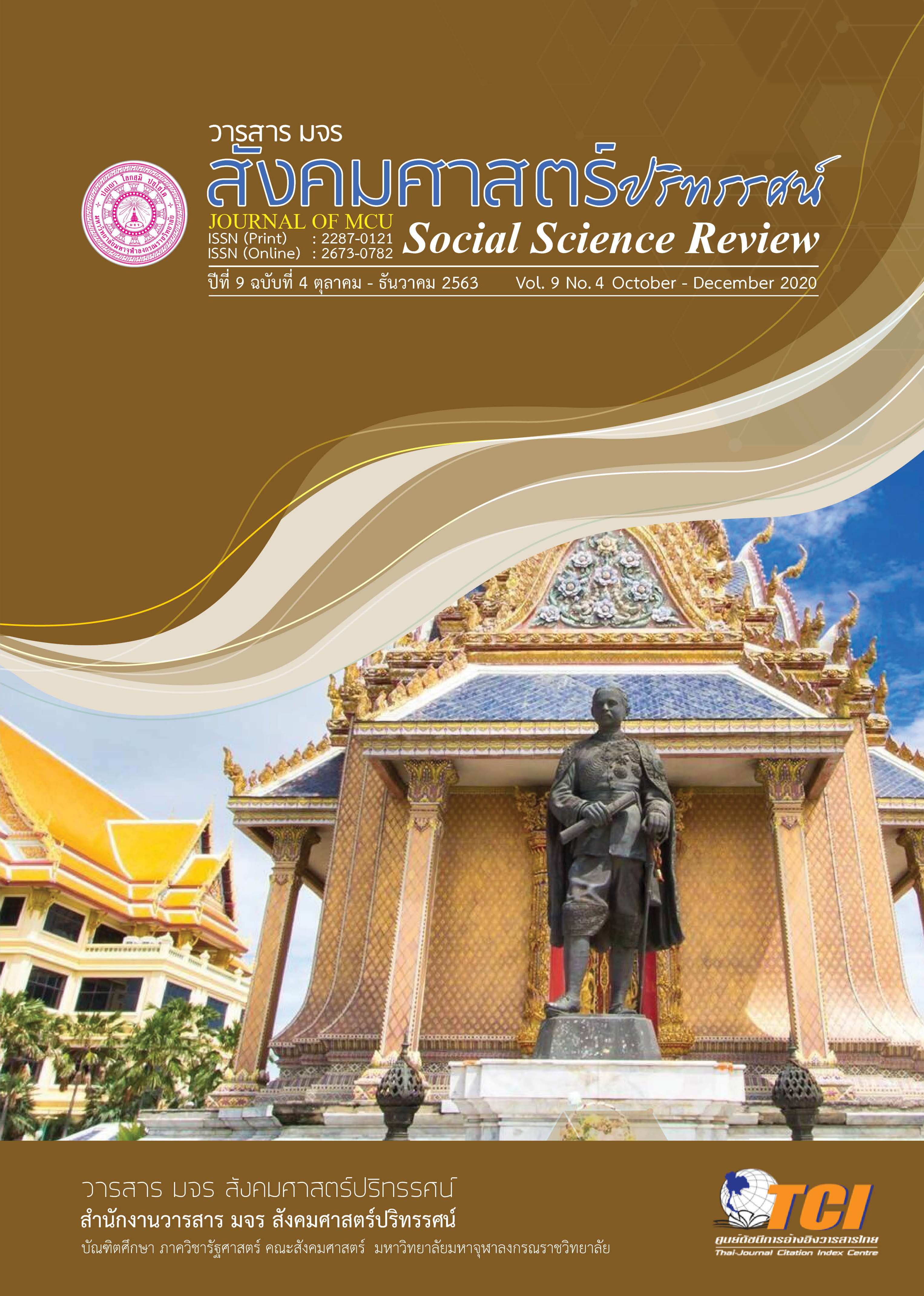การศึกษาการฝึกอบรมทุนมนุษย์เพื่อสร้างความตระหนักรู้ในตนเอง
คำสำคัญ:
การฝึกอบรมและพัฒนา, ความตระหนักรู้ในตนเอง, ทุนมนุษย์บทคัดย่อ
บทความวิจัยนี้มีวัตถุประสงค์เพื่อศึกษาสภาพปัจจุบัน องค์ประกอบของการฝึกอบรมทุนมนุษย์ และพัฒนาการฝึกอบรมเพื่อสร้างความตระหนักรู้ในตนเองสำหรับทุนมนุษย์ โดยใช้วิธีการวิจัยเชิงคุณภาพ เก็บรวบรวมข้อมูลด้วยการสัมภาษณ์เชิงลึกแบบกึ่งโครงสร้างจากผู้ให้ข้อมูลสำคัญ 15 คน ทำการวิเคราะห์ข้อมูลใช้เทคนิคการวิเคราะห์เนื้อหาเพื่อสังเคราะห์ วิเคราะห์ลักษณะร่วมและข้อสรุปร่วม ผลการศึกษา พบว่า สภาพปัจจุบันการพัฒนาการพัฒนาทุนมนุษย์ถือเป็นรากฐานสำคัญของการขับเคลื่อนองค์กรสู่ความสำเร็จ โดยต้องวิเคราะห์พิจารณาบริบทภายในขององค์กรเป็นจุดเริ่มต้น อาทิ วิสัยทัศน์ พันธกิจ ค่านิยมร่วมขององค์กร ภารกิจหน้าที่ รวมถึงศักยภาพของทุนมนุษย์ ขณะที่สภาพแวดล้อมภายนอกองค์กร ควรวิเคราะห์พิจารณาถึงสภาพเศรษฐกิจ สังคม การเมือง และที่สำคัญคือความก้าวหน้าทางเทคโนโลยี เป็นต้น ขณะที่องค์ประกอบของการฝึกอบรมทุนมนุษย์เพื่อสร้างการตระหนักรู้ในตนเองที่สำคัญนั้นประกอบด้วย 1. การเรียนรู้ของสมาชิกในองค์กร 2. ความมีสติ 3. การมีวิสัยทัศน์ร่วมกันของคนในองค์การ 4. การเรียนรู้เป็นทีม 5. ระบบการคิดของคนในองค์การ นอกจากนี้จากการศึกษายังพบว่ากระบวนการพัฒนาการฝึกอบรมเพื่อสร้างความตระหนักรู้ในตนเองสำหรับทุนมนุษย์ถือเป็นหัวใจสำคัญของการพัฒนาองค์กร เพราะหากบุคคลากรในองค์กรขาดทัศนคติที่ดี ความมุ่งมั่นทุ่มเท และรู้สึกว่าตนเองเป็นส่วนหนึ่งหรือมีความเป็นเจ้าขององค์กรแล้วย่อมส่งผลต่อประสิทธิภาพในการทำงานและการดำเนินงานขององค์กร
เอกสารอ้างอิง
จารุเนตร เกื้อภักดิ์. (2559). แนวทางการพัฒนาศักยภาพสายสนับสนุนของมหาวิทยาลัยเทคโนโลยีราชมงคลรัตนโกสินทร์ (วิทยานิพนธ์ปริญญาศิลปศาสตรมหาบัณฑิต สาขาวิชาการจัดการภาครัฐและภาคเอกชน). นครปฐม: มหาวิทยาลัยศิลปากร.
จินต์จุฑา จันทร์ประสิทธิ์. (2559). การพัฒนาทรัพยากรมนุษย์ของบุคลากรทางการศึกษาสถาบันบัณฑิตพัฒนศิลป์ (สารนิพนธ์การศึกษาอิสระปริญญารัฐประศาสนศาสตร์มหาบัณฑิต).นครปฐม: มหาวิทยาลัยเทคโนโลยีราชมงคลรัตนโกสินทร์.
ธนยศ ชวะนิตย์. (2561). รูปแบบกระบวนทัศน์รัฐประศาสนศาสตร์เชิงวัฒนธรรม. วารสาร มจร สังคมศาสตร์ปริทรรศน์, 7(1), 1 – 17.
ธารีรัตน์ ขูลีลัง. (2561). ปัจจัยที่มีอิทธิพลต่อความสามารถในการจัดการทุนมนุษย์: การสำรวจเชิงประจักษ์จากธุรกิจโรงแรมในประเทศไทย. วารสาร มจร สังคมศาสตร์ปริทรรศน์, 7(1), 196-211.
นิติพล ภูตะโชติ. (2556). พฤติกรรมองค์กร. กรุงเทพฯ: สำนักพิมพ์แห่งจุฬาลงกรณ์มหาวิทยาลัย.
บุษกร วัฒนบุตร. (2561). การสร้างตัวแบบการพัฒนาจริยธรรมเพื่อการพัฒนาศักยภาพทุนมนุษย์ ในศตวรรษที่ 21. วารสาร มจร สังคมศาสตร์ปริทรรศน์, 7(1), 273-281.
พระสุธีวีรบัณฑิต (โชว์ ทสฺสนีโย) และคณะ. (2562). รัฐประศาสนศาสตร์เปลี่ยนโลก. วารสาร มจร สังคมศาสตร์ปริทรรศน์, 8(2), 300-314.
พัชรินทร์ คณิตชรางกูร. (2560). การพัฒนาทรัพยากรมนุษย์ของสำนักทหารพัฒนา หน่วยบัญชาการทหารพัฒนา กองบัญชาการกองทัพไทย เพื่อรองรับการเปลี่ยนแปลงสู่ยุคไทยแลนด์ 4.0 (สารนิพนธ์การค้นคว้าอิสระ สาขาบริหารรัฐกิจและกิจการสาธารณะ). กรุงเทพฯ: มหาวิทยาลัยธรรมศาสตร์.
รัตนาภรณ์ บุญนุช. (2555). การพัฒนาและฝึกอบรมที่มีผลต่อประสิทธิประสิทธิภาพของพนักงาน : กรณีศึกษาการไฟฟ้าส่วนภูมิภาคเขต1 (ภาคกลาง) จังหวัดพระนครศรี อยุธยา (สารนิพนธ์การค้นคว้าอิสระ วิชาเอกการจัดการทั่วไป). ปทุมธานี: มหาวิทยาลัยเทคโนโลยีราชมงคลธัญบุรี.
สยามพร พันธไชย. (2562). รูปแบบการจัดการความรู้ตามหลักพุทธธรรมเพื่อการพัฒนาบุคลากร ขององค์กรปกครองส่วนท้องถิ่น. วารสาร มจร สังคมศาสตร์ปริทรรศน์, 8(2), 69-82.
สายสุนีย์ อัศวประเทืองสกุล. (2553). เปรียบเทียบการใช้กลยุทธ์การพัฒนาทรัพยากรมนุษย์ของโรงพยาบาลเอกชนในกรุงเทพมหานคร (วิทยานิพนธ์ปริญญาศิลปศาสตรมหาบัณฑิต สาขาวิทยาการจัดการ). นนทบุรี: มหาวิทยาลัยสุโขทัยธรรมาธิราช.
สุนันทา มิ่งเจริญพร. (2556). การพัฒนาทรัพยากรมนุษย์กับผลการดำเนินงานขององค์การของธนาคารออมสิน สำนักงานใหญ่ (วิทยานิพนธ์รัฐประศาสนศาสตรมหาบัณฑิต สาขานโยบายสาธารณะและการจัดการภาครัฐ). นครปฐม: มหาวิทยาลัยมหิดล.
อภิชาติ พานสุวรรณ. (2561). ผู้นำกับการสร้างความเปลี่ยนแปลง. วารสาร มจร สังคมศาสตร์ปริทรรศน์, 7(1), 282-294.
Senge, M. P. (1990). The fifth discipline: The art and practice of the learning organization. London: Century Press.
ดาวน์โหลด
เผยแพร่แล้ว
รูปแบบการอ้างอิง
ฉบับ
ประเภทบทความ
สัญญาอนุญาต
ลิขสิทธิ์ (c) 2020 วารสาร มจร สังคมศาสตร์ปริทรรศน์

อนุญาตภายใต้เงื่อนไข Creative Commons Attribution-NonCommercial-NoDerivatives 4.0 International License.
เพื่อให้เป็นไปตามกฎหมายลิขสิทธิ์ ผู้นิพนธ์ทุกท่านต้องลงลายมือชื่อในแบบฟอร์มใบมอบลิขสิทธิ์บทความให้แก่วารสารฯ พร้อมกับบทความต้นฉบับที่ได้แก้ไขครั้งสุดท้าย นอกจากนี้ ผู้นิพนธ์ทุกท่านต้องยืนยันว่าบทความต้นฉบับที่ส่งมาตีพิมพ์นั้น ได้ส่งมาตีพิมพ์เฉพาะในวารสาร มจร สังคมศาสตร์ปริทรรศน์ เพียงแห่งเดียวเท่านั้น หากมีการใช้ภาพหรือตารางหรือเนื้อหาอื่นๆ ของผู้นิพนธ์อื่นที่ปรากฏในสิ่งตีพิมพ์อื่นมาแล้ว ผู้นิพนธ์ต้องขออนุญาตเจ้าของลิขสิทธิ์ก่อน พร้อมทั้งแสดงหนังสือที่ได้รับการยินยอมต่อบรรณาธิการ ก่อนที่บทความจะได้รับการตีพิมพ์ หากไม่เป็นไปตามข้อกำหนดเบื้องต้น ทางวารสารจะถอดบทความของท่านออกโดยไม่มีข้อยกเว้นใดๆ ทั้งสิ้น





